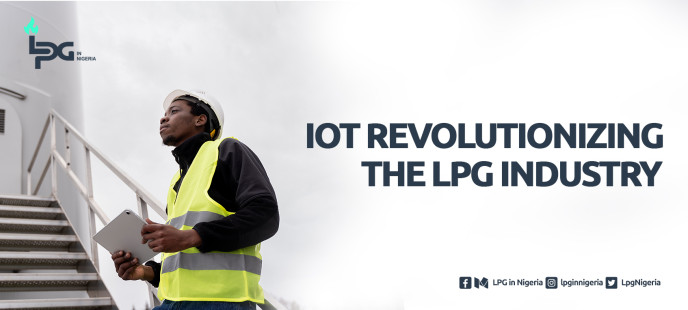- 4439
- 0
Sharing Ideas and Updates on LPG in Nigeria and related information to enable effective collaboration within the LPG Value Chain
IoT Revolutionizing The LPG Industry.

The potential for IoT adoption in the LPG industry spans the entire business, from natural gas extraction and refining to the end user. This transformative technology promises to make the LPG sector safer, smarter, more efficient, and more accessible.
Addressing Accessibility Challenges: With three billion people lacking access to modern energy, the upfront costs associated with LPG equipment pose financial challenges. IoT solutions can mitigate these barriers by leveraging technology to make LPG more financially accessible to those reliant on traditional fuels.
Optimizing Operations: For cylinder filling plants, IoT offers productivity data for identifying areas of improvement and preventive maintenance using sensors. Telemetry, a staple in bulk LPG monitoring, continues to enhance operational efficiency.
Cylinder Management for Safety and Profitability:Managing the estimated two billion LPG cylinders in circulation is both safety-critical and vital for profitability. IoT facilitates cloud storage and real-time updates, including filling dates, market entry dates, maintenance controls, requalification dates, and tracking capabilities.
Enhancing Safety Measures:IoT applications can monitor cylinder fill levels, ensure gas-tight connections, detect leaks, and monitor product temperatures, contributing to overall safety management.
Applications Across the LPG Supply Chain:
Real-time tracking of LPG vessels, estimating arrival times, and improving berthing calculations.
Integrated systems with sensors on pipeline networks, rail tank wagons, and road tankers for end-to-end visibility.
IoT-connected equipment in LPG plants, enabling precise communication with customers for demand-based production.
GPS tracking of LPG cylinder trucks for efficient delivery and monitoring driving behavior.
RFID/Bar-code identification for LPG cylinders, providing detailed information and end-to-end tracking.
End-consumer information on product delivery locations through IoT implementation.
Autogas underground storage tanks with sensors for optimal delivery planning.
Connecting end-users with LPG distributors for better demand prediction and supply chain optimization.
Asset tracking, supply chain optimization, and smart gas metering for operational efficiencies.
The 'SmartGas' Distribution Model:Ensuring the integrity of LPG in cylinders, the SmartGas model tracks cylinders and their contents throughout the journey from filling plants to end consumers, enhancing transparency and safety.
Visibility and Efficiency with IoT:IoT implementation offers companies visibility over their entire LPG vehicle fleet, providing live data on gas levels at customer premises. This improves just-in-time LPG delivery, prevents customer gas shortages, deters illegal refills, and enhances delivery efficiency for distributors.
The integration of IoT applications in the LPG sector signifies a technological leap toward a safer, more efficient, and accessible industry.
The LPG industry in Nigeria stands at the threshold of transformation, driven by the integration of IoT technologies. This concise analysis explores key applications and the significant benefits Nigeria can harness from this technological revolution.
Accessibility Revolution:
IoT solutions break down financial barriers, making LPG more accessible to the population.
Safety Reinforcement:
IoT monitors fill levels, ensures gas-tight connections, and detects leaks, enhancing safety measures.
Operational Efficiency Boost:
Real-time IoT data improves decision-making, optimizing efficiency throughout the LPG supply chain.
Cost Reduction and Supply Chain Optimization:
IoT minimizes demurrage costs by providing real-time monitoring, optimizing the production-to-delivery process.
Transparency with SmartGas Distribution:
'SmartGas' ensures transparency from filling plants to consumers, building trust in the supply chain.
Demand Prediction and Resource Optimization:
IoT accurately predicts demand, optimizing resource allocation for effective industry operation.
Business Growth and Investments:
Attracting investments, IoT fosters business growth, making the industry more appealing to investors.
Government Revenue Generation:
A thriving LPG sector boosts tax revenues, supporting national development initiatives.
Environmental Benefits:
The shift to LPG, facilitated by IoT, contributes to environmental benefits, improving air quality and reducing carbon emissions.
In conclusion, embracing IoT in Nigeria's LPG industry is a transformative journey toward a safer, more efficient, and environmentally conscious energy landscape. As stakeholders align with these advancements, Nigeria is poised to lead the global LPG market, setting new standards for accessibility, safety, and sustainability.
















0 Comment.